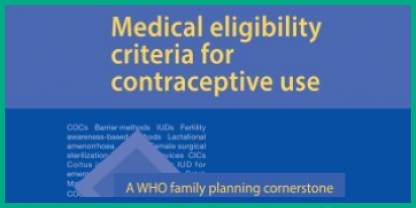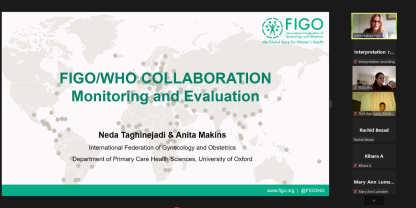FIGO/WHO Family Planning Collaboration
FIGO and the World Health Organization (WHO) are collaborating to enhance family planning care globally, by increasing awareness and utilisation of WHO best practice guidelines on contraceptive use.
Access to reliable contraception can save women’s and children’s lives across the globe. It is estimated that 30% of maternal mortality can be averted by the provision of modern contraceptive methods. The impact on newborn and infant health would also be dramatic. If women space the birth of their children by 24 months nearly a million under 5 deaths could be averted annually (Rutstein 2008).
To ensure universal access to sexual and reproductive services by 2030, OBGYNs and midwives must also have access to the training and education which enables them to provide quality family planning.
Drawing on FIGO’s position as a key stakeholder in the contraceptive world, this project aims to introduce and disseminate key WHO guidelines and tools via FIGO National Member Societies.
WHO Reproductive Health Guidelines
The WHO regularly produces contraceptive guidelines and tools on family planning policies and programmes, including guidance on the safety of various contraceptive methods for use in the context of specific health conditions and characteristics. These are designed to set global standards for developing or updating national guidelines on contraceptive use.
The MEC for Contraceptive Use Project trains, educates and supports cascading learning using the following key resources:
(1) Medical Eligibility Criteria for Contraceptive Use (MEC)
(2) Selected Practice Recommendations for Contraceptive use (SPR) also undergoing revision for the 3rd edition
(3) MEC wheel
(4) Global Handbook for providers also undergoing revision for the 3rd edition
Project Details
The project has been running since 2016 and is currently in the Accelerator Phase which will last 3 years and encompass 14 countries. This year we will focus on the South-East Asia region, with participation from Nepal, Myanmar, India and Timor Leste.
OBGYNs and midwives from these countries will receive training in the most up to date WHO contraceptive guidelines and tools, in a series of regional and national workshops. The first regional workshop took place in Yangon, Myanmar in February 2020, followed by national workshops in each of the countries. There will also be a focus on key areas including: access to adolescents sexual and reproductive health, expansion of method mix, improving quality of family planning services, post pregnancy contraception and community based access.
Past activities and achievements
The first phase of the project known as the Umbrella phase (2016-2018) engaged OBGYNs in Africa, Asia and the Middle East. Participants from the following 14 countries received training in WHO contraceptive guidelines and tools: Egypt, Ghana, India, Kenya, Malawi, Lebanon, Morocco, Nigeria, Pakistan, South Africa, Sudan, Tanzania, Tunisia, Zimbabwe.
This was followed by national workshops, during which participants were able to disseminate their learning in respective countries, through cascade training.
Achievements
• 30-130 participants in each country received training in the most up to date family planning guidelines.
• Strengthened capacity building through training of trainers (TOTs), as providers became trainers.
• Excellent knowledge-uptake from providers, several of whom had no prior knowledge of WHO materials and were then able to improve quality of services in their own countries.
Further Reading
https://www.who.int/reproductivehealth/projects/contraception/en/
https://www.figo.org/news/develop-family-planning-guidelines
https://www.figo.org/news/what-quality-family-planning-counselling-0016186




